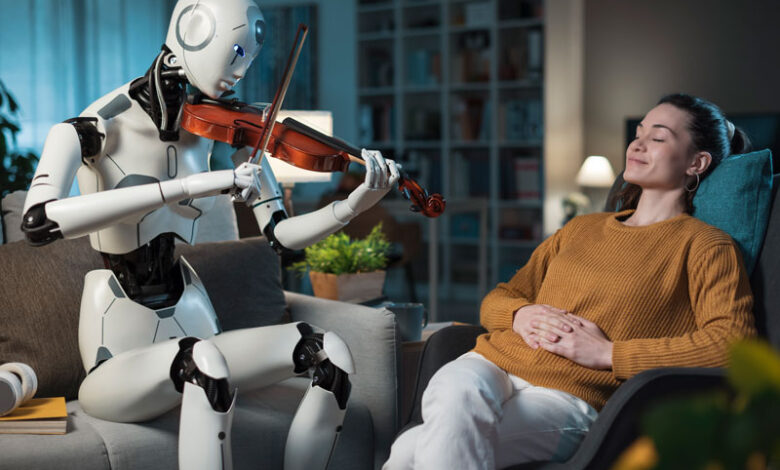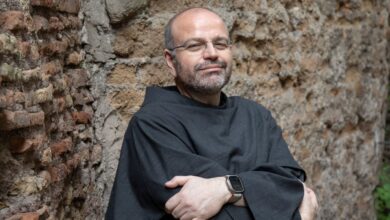AI, embodiment and the faith to understand the difference

A recent meme circulating on social media is a writer’s lament over AI. It asks why we are training it to do more art and writing — rather than the dishes and laundry — so we humans can do more art and writing.
Hey, we all would like a little help at times, whether it is writing a prayer, a commentary (ahem!) or even a subject heading for an email. But it seems like we have made this a complicated process because it could steal livelihoods or spark confusion over whether the information being conveyed is even correct or just AI-generated guesses.
Maybe I’m the only one that has these questions, but over the last few months I’ve been wondering if we will ultimately want to stuff the AI genie back in its bottle only to discover it is too late. What I am exploring here is what A.I. implies about personhood, being hybrids, and more.
To start with the questions: Could using ChatGPT be seen as sinful? Do we need to inform an audience that what we wrote or created was AI generated? Are we wrong for using AI extensions in our search engines? Could it be immoral for our tax dollars to support AI innovations in warfare? Oh and here’s the clincher, can AI make me live longer?
AI and personhood
Many of us are quick to anthropomorphize AI as if we are speaking to it or that it is reflecting an opinion. In fact, in the 2023 quirky Peacock Series “Mrs. Davis,” named for the phone app everyone has, outlines the resistance to the algorithm. “Don’t give it a name. No one calls Facebook Doug,” one of the non-users tells the main character Celeste, who is a nun that wants to singlehandedly unplug the benignly created AI that helps people get what they wish for whether it is a cake, money, or knowledge.
In Christian theological circles, AI has been explored as both promising and with a heaping dose of skepticism. Some pastors have used it to write prayers and some in the pews are likely to rely increasingly on apps that have an AI component to explore the Bible in their congregations. And yet some others see AI as offering humanity an afterlife both here and now (using AI generated content to remember a loved one) and in a sense preserving humanity after it is gone.
I’ve heard some pastors complain that there is something lacking with AI-generated text. It may be factually correct in writing a person’s biography, but the emotion used to describe more detail on one’s reminiscences of a conversation or career is trickier to convey via a series of facts alone.
Use of algorithms to find information on theology or the Bible is just emerging. Could one piece of false interpretation change how faith is practiced in the future? Those helping the AI to learn and read the Bible may shape how some in the pews interact with the Word of God in the future.
“Recent advances in chatbot technology combined with human tendency to anthropomorphize, already enable AI to be treated as a social agent (regardless of whether it possesses that agency),” wrote Mark Graves, research fellow and director at AI & Faith in December 2023 issue of Zygon: Journal of Religion and Science.
Graves takes on this idea that AI is only embodied in robotic form. He claims that AI has a different type of body and perceives and acts in its world in ways distinct from humans. AI lacks the ‘coherent and consistent self’ to consider the social and moral impacts of its actions. He points out that machine learning systems have the capacity for habitual responses, but do not yet build on cognitive structures or associate them with social roles.
The hybrid to follow?
Of course in recent weeks, there have been headlines regarding Elon Musk’s Neuralink technology getting the go ahead from the FDA to move on to a second patient in what has been a closely watched series of trials. Initially the company had enrolled 10 patients last year for the trials that are designed to give paralyzed patients the ability to move limbs again by thinking alone via a brain-computer interface. The demand from the public to participate in clinical trials has been great and the first ‘in-human’ study of the technology is set to run through 2031.
The first patient to receive the Neuralink implant is Noland Arbaugh, who is paralyzed from the waist down after a diving accident. Since having the implant in a procedure in January he has been able play videos and scroll through the internet only using his thoughts.
But there is a secondary discussion of what it will take to digitally upload ourselves to have a ‘digital afterlife’ and at the heart of it is an AI that could somehow store some of our very essence as the ultimate proposed extension of life by the transhumanism community.
Lutheran theologian Ted Peters picks up on this thread in a recent blog post on Patheos. It is easy to see secular objection to the practice as well as theological questions around it. There has even been a discussion in recent years by Peters and others about AI being at the heart of a ‘post-human’ civilization where we are able to live on akin to Steven Spielberg’s A.I. Artificial Intelligence film released in 2001. Let’s not even go into Stanley Kubrick’s 2001: A Space Odyssey that introduced us to HAL 9000 in 1968.
Peters argues, though, against the implementation of such a digital immortality without real thought given to a sound theory of the human person.
“You and I are so much more than the patterns with which our brain thinks,” he writes. “Each of us is a precious self with a God-given physical body. To discard our body like we thoughtlessly discard an empty Coke can fails to recognize that the body is so valuable that God took on a human body in the incarnation. God blesses our body because the body contributes to making us who we are. “
It is here where the idea of humans and technology merging gets murky because we are more than just a body and we are more than just our 100 billion neurons firing off in our brain. And yet we are even so much more than the technology we create to mimic and advance our own intelligence. This is why AI will continue to fascinate, captivate and spook us with its unlimited potential all at the same time.
Susan Barreto
Susan is an author with a long-time interest in religion and science. She currently edits Covalence, the Lutheran Alliance for Faith, Science and Technology’s online magazine. She has written articles in The Lutheran and the Zygon Center for Religion and Science newsletter. Susan is a board member for the Center for Advanced Study of Religion and Science, the supporting organization for the Zygon Center and the Zygon Journal. She also co-wrote Our Bodies Are Selves with Dr. Philip Hefner and Dr. Ann Pederson.



